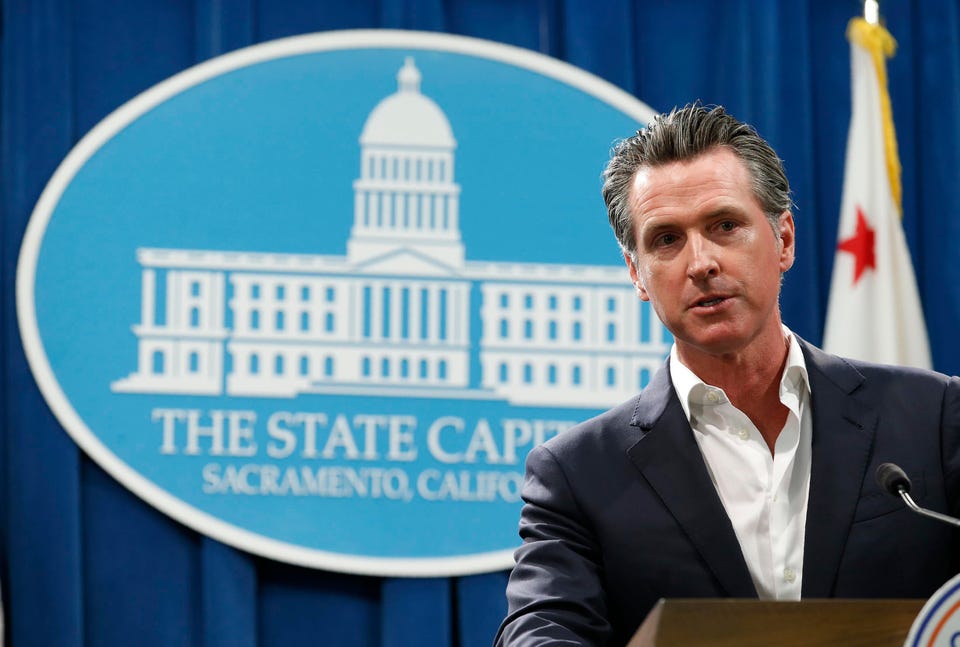Policy California Gavin Newsom Is Praised For Nation’s First Union Dues Tax Credit, But It’s Not A Done Deal Patrick Gleason Contributor Opinions expressed by Forbes Contributors are their own. I cover the intersection of state & federal policy and politics. New! Follow this author to improve your content experience.
Got it! Jul 11, 2022, 04:30am EDT | Share to Facebook Share to Twitter Share to Linkedin California Governor Gavin Newsom (AP Photo/Rich Pedroncelli) Copyright 2019 The Associated Press. All rights reserved California’s new 2022-2023 budget, which was signed by Governor Gavin Newsom (D) on June 27, has received coverage in this space and other outlets for including the nation’s first income tax credit for union dues payments. This unprecedented tax credit, which will be unavailable to most California workers, the vast majority of whom are not in a union, was praised by union leaders and progressive organizations shortly after Newsom signed the new budget.
While news reports indicate the new tax credit will take effect as part of the recently enacted state budget, that’s not entirely accurate. Further legislative action will be required in order for this union-specific tax break to take effect. According to the California Assembly Budget Committee’s June 29 floor report , “The credit will be established in statute in a trailer bill later in the session but the credit will not be in effect until activated through future budget action.
” That budget trailer bill, SB 189 , was signed by Governor Newsom on June 30. The language of SB 189 makes it clear that enactment of the union dues tax credit is far from a done deal: “Contingent upon future legislation, including future budget appropriations, and subject to a determination in the spring of 2024 that General Fund money over the multiyear forecasts is available to support ongoing augmentations and actions, the following actions will be prioritized: (1) Implement a tax credit under the Personal Income Tax Law to offset a portion of costs associated with union membership. ” Even though Newsom is already receiving plaudits for the union dues tax credit, whether that tax credit will actually take effect won’t be known for two years.
“Given the uncertain future, the Budget includes the enactment of a limited number of ongoing proposals, subject to a determination in the spring of 2024 that the General Fund can support these policies over the multi-year forecast,” notes the budget summary released by Governor Newsom’s office. MORE FOR YOU Biden’s Proposed IRS Bank Account Snooping Authority Runs Into State Resistance 2021 Diversity Green Card Lottery Winners To Be Shut Out Because Of Visa Deadline The Swamp Grew – Even Under President Donald Trump “Ever since the U. S.
Supreme Court’s 2018 decision in Janus v. AFSC SC ME struck down as unconstitutional state laws requiring public employees to pay union dues or fees, unions and allied state lawmakers have sought to compensate for the resulting, and ongoing, loss of revenue and political influence,” said Maxford Nelsen, director of labor policy at the Freedom Foundation, of the motivation behind the union dues tax credit. “A lot of bad, coercive policies have been enacted by union-dominated states seeking to undermine Janus, but California’s proposal to create a tax credit for union dues could be the worst yet.
” The vast majority of political spending by unions is directed toward helping Democratic candidates. Critics of California’s union dues tax credit note that it would force all California taxpayers, including the more than 84% of workers who are not members of a union, to subsidize union political advocacy and campaign spending. “Whereas, prior to Janus , the burden of subsidizing union speech and advocacy fell on public employees (paid with taxpayer dollars), a union dues tax credit would place the burden squarely on taxpayers,” Nelsen added.
“But no one—neither public employees nor taxpayers—should be forced by government to fund the political advocacy of private special interest groups. ” California is among the few states where a large tax hike on employers was enacted in the middle of the pandemic-driven economic downturn. In the summer of 2020, when there were no vaccines on the horizon and many businesses were in the process of or on their way to permanently shutting down, Governor Newsom and state lawmakers raised taxes on employers by billions of dollars.
Now that the budget situation has improved in many states, with most currently sitting on budget surpluses, many governors and lawmakers have enacted broad income tax rate reduction over the past year and a half. California is not among those states where lawmakers are considering income tax rate reduction. The most significant tax relief Newsom and company have approved include a tax cut for cannabis and the aforementioned tax credit for union dues.
Though the credit for dues payments would provide union members in California with a tax break not available to most, they will have to wait two more years to find out if they can bank on the new dues tax credit. Given California’s notoriously volatile revenue collections, there is a real possibility the Golden State will not be in a financial position in 2024 to provide the tax credit, one that’s not on the books in any other state, to such a small segment of the workforce. Gavin Newsom and state legislators will continue to receive praise from key Democratic constituencies for the union dues tax credit.
Though when it comes to the matter of whether this new tax break will be permanently codified, “we’ll see” is probably the best answer. Follow me on Twitter . Patrick Gleason Editorial Standards Print Reprints & Permissions.
From: forbes
URL: https://www.forbes.com/sites/patrickgleason/2022/07/11/california-gavin-newsom-is-praised-for-nations-first-union-dues-tax-credit-but-its-not-a-done-deal/
